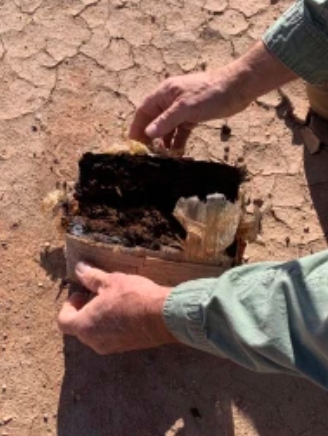Border Talk (10)
Ron and a few buddies were out hunting javelina when they came across a kilo of marijuana a half mile from our house. It speaks to Ron’s tracking abilities to notice something no bigger than a loaf of banana bread among the creosote and mesquite. The guys waited until they got back home to open it. It was clear by the cellophane wrapping and the dank, musty herb, that it had been left behind by a smuggler quite some time ago.
There is much to contemplate when finding a bundle of marijuana so close to the house. Most obvious, who left it behind and why? I wondered if the smuggler followed a random cow path through the desert or if our property is on a map commonly used by drug mules. The next day, while hunting another part of the ranch, the guys came across a camouflage backpack, the second one found by hunters this season. How many more were out there?
This is one kilo of dope in sea of controversy. Drugs are a social and economic problem. Incarceration of first-time offenders is ripping apart families and causing greater division and disparity for minorities. Smuggling drugs into this country has led to a political frenzy dividing our country- build the wall. Don’t build the wall. Try sharing your opinions on border issues at a dinner party, and you will soon find out who your friends are. I am more curious about who these people are. Where did they come from and who did they leave behind?
I put myself through college as a server at a Greek restaurant in Milwaukee. The kitchen staff was made up entirely of illegal migrants from Mexico. I was taking eighteen credits a semester and waiting tables full-time. The people I worked with became my friends. We were a big, extended family who took care of one another. The guys worked long hours and crashed in an old house owned by The Greek. Many of the girls dated and eventually married the cooks, bakers, and dishwashers, my youngest sister among them. We met after work in backyards where we grilled meat and drank beer around campfires. We celebrated baptisms, birthdays, quinceañeras, and weddings with delicious Mexican food and shots of tequila. There was a lot of drama, laughter, and confusion. Milwaukee girls in love with Mexican boys. A culture clash ending in happily ever after for some and disaster for others.
It was the early ’90s. Bill Clinton was President, Seinfeld was a hit, and Madonna and Whitney Houston dominated the pop music charts. My friendships deepened, and I traveled to Mexico to meet families and attend parties. This was my life and it seemed normal, but it wasn’t normal. My Mexican friends had complicated lives. All of them had come up through Nogales, Naco, Douglas, and other border towns after paying a king’s ransom to coyotes who guided them through the desert. Often, a friend would return to Mexico after learning a family member was sick or dying. Months would pass before he returned to work. I had no idea what “crossing the border” meant. The topic was off limits. We knew not to ask.
Twice in the four years I worked for The Greek, the kitchen was raided by immigration officers. “La migra!” someone shouted, and in the blink of an eye the kitchen was deserted, leaving customers and waitstaff stunned. Both times the restaurant was closed while food spoiled, and we were grilled by immigration officers in navy blue windbreakers. How many illegal immigrants work in the kitchen? Where do they live? What are their names? “Illegals? I don’t know any illegals.” We lied to protect our friends, boyfriends, fiancés, and husbands.
Cartel kingpins don’t lug backpacks loaded with bundles of marijuana through the desert. No, they are at home with their families behind stone walls guarded by thugs. The guy risking his life in the desert heat to avoid Border Patrol is low man on the totem pole. Is he dangerous? Yes. I certainly would not want to run into him while working in the orchard. But I think some of these folks have a lot more in common with my Mexican friends from the restaurant than they do with their cartel bosses. Many of them are poverty-stricken men and boys who left home hoping to find jobs in the United States to support their families. Some make it as far as Milwaukee where they find work. Others are not so lucky. Hungry and out of options, they are recruited at the border to smuggle drugs.
Believe me, I was alarmed when Ron came home with the kilo of dope. I want the smuggler caught and locked up. What I wrestle with is how sometimes good people choose to do bad things, especially when their choices are not as black and white as we are led to believe. It is much easier to stamp a label on a collective whole (those damn drug smugglers) than it is to see people as individuals.
I am grateful for the four years I worked at the Greek restaurant. Those experiences and relationships shaped how I see the world. In some ways it’s ironic I ended up in living on the border in the same desert my friends crossed to get to America. In other ways, I am exactly where I am supposed to be. The stories, language, and laughter I collected while waiting tables, drinking around campfires, and walking miles of open country deep in the heart of Mexico live inside me.


